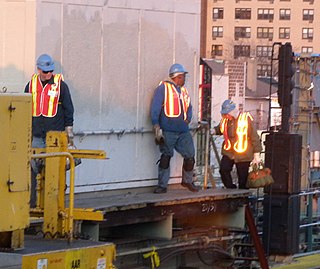
A tradesperson or tradesman/woman is a skilled worker that specialises in a particular trade. Tradespeople (tradesmen/women) usually gain their skills through work experience, on-the-job training, an apprenticeship program or formal education.

A camera operator, or depending on the context cameraman or camerawoman, is a professional operator of a film camera or video camera as part of a film crew. The term "cameraman" does not necessarily imply that a male is performing the task.

The Communications Workers of America (CWA) is the largest communications and media labor union in the United States, representing about 700,000 members in both the private and public sectors. The union has 27 locals in Canada via CWA-SCA Canada representing about 8,000 members. CWA has several affiliated subsidiary labor unions bringing total membership to over 700,000. CWA is headquartered in Washington, DC, and affiliated with the AFL–CIO, the Strategic Organizing Center, the Canadian Labour Congress, and UNI Global Union.
BTS is a South Korean boy band.
Broadcast engineering or radio engineering is the field of electrical engineering, and now to some extent computer engineering and information technology, which deals with radio and television broadcasting. Audio engineering and RF engineering are also essential parts of broadcast engineering, being their own subsets of electrical engineering.

The International Alliance of Theatrical Stage Employees, Moving Picture Technicians, Artists and Allied Crafts of the United States, Its Territories and Canada, known as simply the International Alliance of Theatrical Stage Employees, is a North American labor union representing over 168,000 technicians, artisans, and craftspersons in the entertainment industry, including live theatre, motion picture and television production, broadcast and trade shows in the United States, its territories, and Canada. It was awarded the Tony Honors for Excellence in Theatre in 1993.

A mechanic is a skilled tradesperson who uses tools to build, maintain, or repair machinery, especially cars.

A construction worker is a worker employed in the physical construction of the built environment and its infrastructure.

A surgical technologist, also called a scrub, scrub tech, surgical technician, or operating department practitioner or operating room technician, is an allied health professional working as a part of the team delivering surgical care. Surgical technologists are members of the surgical team. The members of the team include the surgeon, surgeon's assistant, circulator nurse and anesthesia provider. They possess knowledge and skills in sterile and aseptic techniques. There are few mandatory professional requirements for surgical technologists, and the scope of practice varies widely across countries and jurisdictions. Surgical technologists attend junior colleges and technical schools, and many are trained in military schools. In the military they perform the duties of both the circulator and the scrub. The goal is for surgical technologists to be able to anticipate the next move the surgeon is going to make in order to make the procedure as smooth and efficient as possible. They do this by having knowledge of hundreds of surgical procedures and the steps the surgeon needs to take in order to complete the procedure, including the very wide range of surgical instruments they may need. Specialties can include, but are not limited to, the following: genitourinary, obstetrics and gynaecology, urology, ENT, plastics, general, orthopedics, neurology, and cardiovascular. They only work in surgical or perioperative areas and are highly specialized. Surgical technologist is the proper term for a two-year program which earns a degree in applied sciences. The profession is up and coming and highly in demand.
The National Institute for Certification in Engineering Technologies (NICET) is an organization that was established in 1961 to create a recognized certification for engineering technicians and technologists within the United States. A 1981 study by the National Cooperative Highway Research Program (NCHRP), requested by the American Association of State Highway and Transportation Officials' SubCommittee On Construction (AASHTO SCOC), prompted the National Society of Professional Engineers (NSPE) to merge two certification bodies; the Institute for the Certification of Engineering Technicians (ICET) and the Engineering Technologist Certification Institute. The result is a nonprofit organization that provides a nationally recognized and accepted procedure for recognition of qualified engineering technicians and technologists.

An engineering technician is a professional trained in skills and techniques related to a specific branch of technology, with a practical understanding of the relevant engineering concepts. Engineering technicians often assist in projects relating to research and development, or focus on post-development activities like implementation or operation.

Illinois Technical College was a small private junior college that specialized in teaching electronics theory and repair. The college was located in the Loop area of downtown Chicago, Illinois, United States, on Wabash Avenue. The college is no longer in operation, having closed in 1992. Records from the school are held by the Illinois State Board of Education.

In film and television crews, the gaffer or chief lighting technician is the head electrician, responsible for the execution of the lighting plan for a production. The gaffer's assistant is the best boy electric.
A systems analyst, also known as business technology analyst, is an information technology (IT) professional who specializes in analyzing, designing and implementing information systems. Systems analysts assess the suitability of information systems in terms of their intended outcomes and liaise with end users, software vendors and programmers in order to achieve these outcomes. A systems analyst is a person who uses analysis and design techniques to solve business problems using information technology. Systems analysts may serve as change agents who identify the organizational improvements needed, design systems to implement those changes, and train and motivate others to use the systems.
Green jobs are, according to the United Nations Environment Program, "work in agricultural, manufacturing, research and development (R&D), administrative, and service activities that contribute(s) substantially to preserving or restoring environmental quality. Specifically, but not exclusively, this includes jobs that help to protect ecosystems and biodiversity; reduce energy, materials, and water consumption through high efficiency strategies; de-carbonize the economy; and minimize or altogether avoid generation of all forms of waste and pollution." The environmental sector has the dual benefit of mitigating environmental challenges as well as helping economic growth.

A drafter is an engineering technician who makes detailed technical drawings or CAD designs for machinery, buildings, electronics, infrastructure, sections, etc. Drafters use computer software and manual sketches to convert the designs, plans, and layouts of engineers and architects into a set of technical drawings. Drafters operate as the supporting developers and sketch engineering designs and drawings from preliminary design concepts.

The United States Department of Commerce and Labor was a short-lived Cabinet department of the United States government, which was concerned with fostering and supervising big business. It existed from 1903 to 1913. The United States Department of Commerce is its successor agency, and it also is the predecessor of the United States Department of Labor.

An electronics technician help design, develop, test, manufacture, install, and repair electrical and electronic equipment such as communication equipment, medical monitoring devices, navigational equipment, and computers. They may be employed in product evaluation and testing, using measuring and diagnostic devices to adjust, test, and repair equipment. Electronics technicians may also work as sales workers or field representatives for manufacturers, wholesalers, or retailers giving advice on the installation, operation, and maintenance of complex equipment and may write specifications and technical manuals. Electronics technicians represent over 33% of all engineering technicians in the U.S. In 2009, there were over 160,000 electronics technicians employed in the U.S. Electronics technicians are accredited by organizations such as the Electronics Technicians Association, or International Society of Certified Electronics Technicians.
A healthcare technician is a health professional that provides care to patients. Healthcare technician's primary position is to assist medical staff complete tasks around their assigned unit or clinic's and accommodate patient needs. Healthcare technicians are typically found in specialty clinics, intensive care, emergency departments, or laboratory collection facilities. Technicians will perform basic cardiology reports such as, electrocardiograms and will have basic understanding of bodily function. The technician is an integral member of the unit-based healthcare team, they contribute to the continuity of care by decreasing fragmentation through decentralization of selected diagnostic and therapeutic treatment modalities.

A laboratory technician is a person who works in a laboratory performing analytical or experimental procedures, maintaining laboratory equipment.














